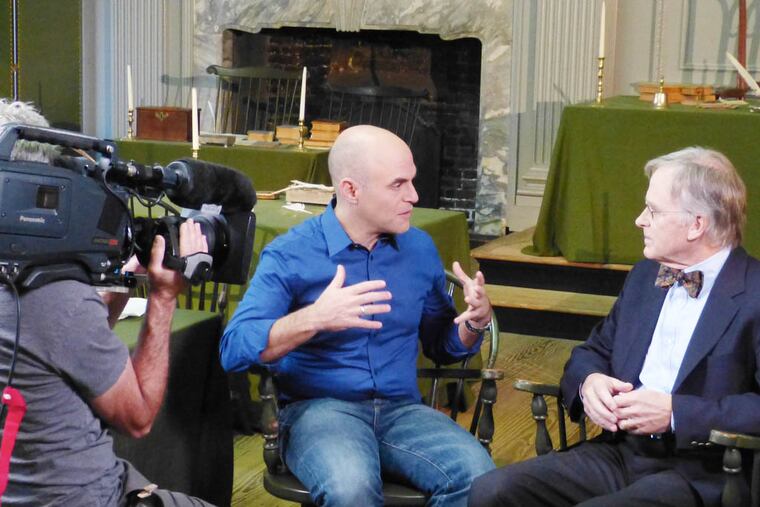
* CONSTITUTION USA WITH PETER SAGAL. 9 p.m. today, WHYY 12.
* TED TALKS EDUCATION. 10 p.m. today, WHYY 12.
IT DOESN'T take PBS' "Constitution USA with Peter Sagal" long to get to Philadelphia, where the document got hammered out.
First, though, Sagal had to buy a motorcycle.
Traveling on a customized red-white-and-blue Harley-Davidson - what could be more American? - the host of NPR's "Wait Wait . . . Don't Tell Me!" crisscrosses the country in this monthlong series to talk with people about the document that was ratified nearly 225 years ago and has been causing arguments ever since.
Based on tonight's hour-long premiere, which takes Sagal to Independence Hall, the Hoover Dam and a medicinal-marijuana dispensary in California, this is an unusually lively civics lesson.
The motorcycle doesn't hurt, said Richard Beeman, a University of Pennsylvania history professor who lent his expertise to the project and gives Sagal a tour of the room in which the Constitution was drafted.
Beeman got to ride by Independence Hall on the back of Sagal's bike, an experience he described as "one of the thrills of my life."
But, according to the historian, whose books include Plain Honest Men: The Making of the American Constitution, it's not just lack of horsepower that's keeping Americans in the dark about their government. (In one 2011 survey, only 38 percent of respondents could name the three branches, and Beeman adds that in an earlier poll 70 percent of teens did better naming the Three Stooges.)
Even at Penn, "I am finding that my students come in not knowing" much about the Constitution, he said.
"I don't care if they can't memorize every phrase of the Constitution," he said. "I mean, you read the section on the Electoral College, and your eyes glaze over. But it is important that they know how it works. And so I would say, in the course that I teach in the Revolution and Constitution, I'd say about half of my students actually don't know how the Electoral College works.
"The variation in what they know depends entirely almost on the quality of the history instruction and civics instruction they've had in high school and middle school," Beeman said. "And as you probably know, we've got terrific history and civics teachers out there and we've got some really terrible ones."
How would he change the way history's taught?
"First of all, it is all about stories. It's not about memorizing the text. It's all about the stories, about the way our Constitution . . . has evolved, and the way it works. And so, in this case, [Sagal has] had four hours to tell some really interesting stories. I've got a whole semester to do it and I really do try to teach these courses as a narrative."
'TED Talks Education'
There's not a motorcycle in sight in PBS' "TED Talks Education," but Penn is also well-represented in this special tonight about changing the way kids are taught - to keep them from dropping out of school.
Hosted and featuring performances by singer and composer John Legend (University of Pennsylvania, Class of '99), this is the first TV special from TED (which stands for Technology, Entertainment, Design), and it's mostly a series of short lectures about education reform from people like Bill Gates and Geoffrey Canada.
Angela Duckworth, an assistant professor of psychology at Penn (and a former middle school math teacher), contributes some thoughts about the importance of grit, rather than IQ, as a predictor of success. Curiously, hers may be the only talk with suggest the responsibility for education falls on more than just teachers.
On Twitter: @elgray
Blog: ph.ly/EllenGray